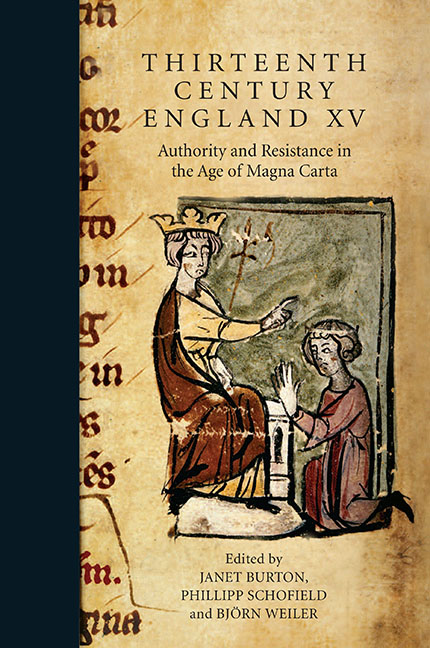 Thirteenth Century England XV
Thirteenth Century England XV Published online by Cambridge University Press: 11 June 2021
The day after King Henry III was captured at the battle of Lewes on 14 May 1264 letters patent were issued in his name by the victorious baronial reformers led by Simon de Montfort, earl of Leicester. The very first of these neither concerned constitutional reform nor made any declarations concerning the battle, but instead was addressed to ‘knights and others’ in Windsor Castle and fourteen other castles instructing them ‘not to go out of the said castle to do any ill in those parts, or permit any to be done, upon peril of all the lands they hold in the realm’. The issue of the control of castles and their garrisons was one of the first priorities of Montfort and his supporters. The list of castles provides a revealing insight into the geographical extent of the strategic knowledge of the rebels on the morrow of Lewes, indicating that this awareness stretched as far north as Nottingham and Lincoln and as far west as Winchester and Salisbury. The letters patent also mark the start of their efforts to secure the military dominance of the new regime. In this they achieved great success, reducing the royalists in England to a small handful of garrisons by the end of March 1265. This paper will examine the reasons behind Montfort's success but will also argue that the resistance of the remaining royalist garrisons played a role in determining the final fate of Montfort and his regime in the summer of the same year.
The ‘Bones of the Kingdom’
The role of castles during the English civil war known as the Barons’ War has been surprisingly little studied. While much attention has been paid to the campaigns culminating in the Battles of Lewes and Evesham, attention to castles has usually been restricted to brief mentions in more general accounts of the conflict, most recently in Adrian Jobson's excellent book on the struggle. While we lack the sheer amount of material available to historians of Edward I's reign, as shown, for example, in Fiona Watson's work on Edwardian castle garrisons in Scotland, the field for the Barons’ War is by no means a desert.
To save this book to your Kindle, first ensure [email protected] is added to your Approved Personal Document E-mail List under your Personal Document Settings on the Manage Your Content and Devices page of your Amazon account. Then enter the ‘name’ part of your Kindle email address below. Find out more about saving to your Kindle.
Note you can select to save to either the @free.kindle.com or @kindle.com variations. ‘@free.kindle.com’ emails are free but can only be saved to your device when it is connected to wi-fi. ‘@kindle.com’ emails can be delivered even when you are not connected to wi-fi, but note that service fees apply.
Find out more about the Kindle Personal Document Service.
To save content items to your account, please confirm that you agree to abide by our usage policies. If this is the first time you use this feature, you will be asked to authorise Cambridge Core to connect with your account. Find out more about saving content to Dropbox.
To save content items to your account, please confirm that you agree to abide by our usage policies. If this is the first time you use this feature, you will be asked to authorise Cambridge Core to connect with your account. Find out more about saving content to Google Drive.